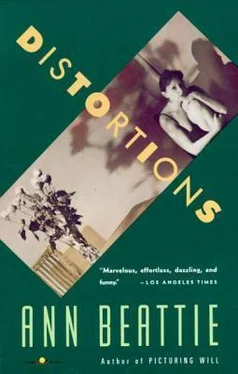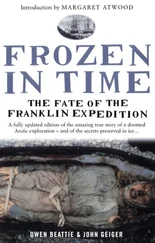Ann Beattie - Distortions
Здесь есть возможность читать онлайн «Ann Beattie - Distortions» весь текст электронной книги совершенно бесплатно (целиком полную версию без сокращений). В некоторых случаях можно слушать аудио, скачать через торрент в формате fb2 и присутствует краткое содержание. Год выпуска: 1991, Издательство: Vintage, Жанр: Современная проза, на английском языке. Описание произведения, (предисловие) а так же отзывы посетителей доступны на портале библиотеки ЛибКат.
- Название:Distortions
- Автор:
- Издательство:Vintage
- Жанр:
- Год:1991
- ISBN:нет данных
- Рейтинг книги:5 / 5. Голосов: 1
-
Избранное:Добавить в избранное
- Отзывы:
-
Ваша оценка:
- 100
- 1
- 2
- 3
- 4
- 5
Distortions: краткое содержание, описание и аннотация
Предлагаем к чтению аннотацию, описание, краткое содержание или предисловие (зависит от того, что написал сам автор книги «Distortions»). Если вы не нашли необходимую информацию о книге — напишите в комментариях, мы постараемся отыскать её.
Distortions — читать онлайн бесплатно полную книгу (весь текст) целиком
Ниже представлен текст книги, разбитый по страницам. Система сохранения места последней прочитанной страницы, позволяет с удобством читать онлайн бесплатно книгу «Distortions», без необходимости каждый раз заново искать на чём Вы остановились. Поставьте закладку, и сможете в любой момент перейти на страницу, на которой закончили чтение.
Интервал:
Закладка:
“But his expression,” David said to the doctor as the doctor was leaving. “You wouldn’t look so happy if you were a three-year-old with a broken leg,” the doctor assured him.
A vacationing photographer and his wife, who had stopped to eat at the restaurant, noticed Wally’s pictures hung in back of the cash register and wanted to buy them. David wouldn’t part with them, but he let the photographer take pictures. David didn’t think much of it. About a month later, though, the photographer was back, this time with another man. They wanted to write an article about Wally for a magazine; Wally’s art would appear with it. Sheila was delighted. She told the men that her son was artistic, like her. David felt that they should think about it; what if he developed a terrific ego? “He’s already strange,” Sheila said. The photographer took pictures of Wally at his fourth birthday party. There was also a birthday interview, during which Wally echoed everything the interviewer asked:
“Do you like to draw a lot, Wally?”
“Do you like to draw a lot, Wally?”
“Ha! You’re a nice kid. And a good artist.”
“Ha! You’re a nice kid. And a good artist.”
“Do you know any famous artists, Wally?”
“Do you know any famous artists, Wally?”
“Have you ever heard of the Mona Lisa?”
“Have you ever heard of the Mona Lisa?”
“Sure, I have. Have you ever seen it?”
“Sure, I have. Have you ever seen it?”
“You don’t feel like talking today, do you?” the photographer asked.
Wally pulled up his top lip, showing his two big front teeth. “You don’t feel like talking today, do you?” he repeated.
“Nope. I’ll just take some pictures,” the photographer said.
A little girl from Wally’s party stood on her head for the photographer. The photographer noted with interest that Carters still manufactured white pants with yellow roses on them.
Wally’s fourth birthday party was immortalized on a magazine cover. There was a picture of Wally’s head, and above it, in little balloons as if he were imagining them, reproductions of his drawings. The magazine sold a lot of copies, tourists came to the restaurant, Sheila agreed to part with a few drawings — to museums only — and Wally jumped off the roof of David’s station wagon and broke his right arm five days after the cast was removed from his left leg.
Sheila consulted a child psychologist, who had written them to say how interested he was in Wally. She wrote that Wally jumped off of cars and tables and broke his bones. What was she to do? The psychologist appeared in person! Perhaps it was related in some way to her being a ballerina. After that, she beat her legs much harder at night, danced in private, locked the basement door to Wally when she gave lessons. The psychologist, in answer to David’s question about why Wally repeated what was said to him, suggested that it might be related to David’s memorization and quotation of F. Aha! From then on he thought F. He said nothing. Wally didn’t break any more bones. During the year he gave up repeating things. He also gave up art. In fact, when he had to color maps in the first grade, he did it sloppily. “What is your new interest?” David asked Wally optimistically. “Nothing,” Wally said.
In the second grade Wally had a girlfriend, who was in the fifth grade: Susan Leigh. They played the harmonica to each other. When his romance with Susan Leigh ended he took a leap — again from the car top — crashing the harmonica with his fall. Sheila wrote to the child psychologist, saying that Wally was no longer interested in doing anything. After a long time she got a letter. The doctor had retired and was living in the Bahamas. There was a check for eight dollars with the letter. The doctor asked her if she would buy a best-seller he had read about and send it to him, as it was unavailable on his island. She had trouble finding Murderous Midnight , and about a month later she received an angry note from the doctor, asking why she had failed him.
In the fifth grade, Wally was expelled from school, along with another boy; the two had forced a younger boy to pick up a stick and peel off the bark and eat it. Two years later, when he began junior high school, he told his father he wanted permission to marry another thirteen-year-old. “Where would you live?” David asked. “In a tent,” Wally said. “Where would you live in the winter?” David asked. David won his point, but Wally did not speak to him for two months. Then he asked again for David to sign the necessary papers, and for David to give him enough money to live in an apartment during the winter with his bride. “You owe it to me for exploiting me,” Wally said. “I never exploited you,” David told him. Again, Wally did not speak for a long time. His silence was now as predictable as his mimicry when he was younger. Apparently he also refused to speak in school, and a new teacher thought that he was deaf. They would not allow him to continue school until a doctor had tested his hearing. This made Sheila and David angry, and they told Wally that he was being ridiculous. He ran away. He lived in a tent not far from home. He was dirty. He said he wanted to take a trip to New York when David went to the tent to talk to him. “Here, take it,” David said, giving him the money. “I’m sick of all this.” Wally went to New York, then returned to the tent. He never returned to school.
There was a family meeting when Wally dropped out of school. It was the second family meeting they had ever had; the first — when his mother felt that they were drifting apart because of their separate interests, shortly before Wally left for the tent — had not been very successful. Wally explained how to pitch a tent, and his father talked about the virtues of homemade pasta, and after his mother insisted that store-bought pasta tasted exactly the same and that when you bought it in a store you didn’t have to spend half a day scraping crap out of a pasta machine, she did a plié. One plié. Then, no more energy left, sat down. That night she slept in the same chair, and the following day she clawed the upholstery on the chair arm before she left it.
“We did not get to the essence of Wally’s problem,” David said to Sheila as they cleaned up the restaurant.
“He doesn’t have any real problem. He’s just a selfish son of a bitch like you,” she said.
“Why do you say he’s selfish?”
“I’m not going to clean that pasta machine tonight or any other night as long as I live,” Sheila screamed, and ran ungracefully from the restaurant.
David began keeping a journal. Mostly it was criticism of Sheila or worries about Wally, and when David realized this he made an effort to say more about his own feelings and life. His feelings were so clichéd that he couldn’t go on with them, though: “I am a nothing,” “Nobody loves me,” “Some days I wonder why I’m alive.” So after a while the book began to fill up with receipts, bills he still had to pay, snapshots, even letters from Wally’s former child psychologist, who was now a severely disturbed man.
“What is that thing?” Sheila asked.
“Unpaid bills,” David said.
“Then why don’t you pay them?” she asked.
Wally began seeing the sister of his second-grade sweetheart, Susan Leigh. They ate out of cans in Wally’s tent. She hung an Escher print in the tent and told Wally he should paint and draw again. Her name was Dianna Leigh. Susan visited the tent once or twice, when she was in town. She was appearing sporadically in off-off-Broadway plays and living with another woman who was in the process of being changed surgically into a man. The woman-man liked the Escher print. Susan declined an offer of Spam on a roll. “Aren’t you vegetarians?” the woman-man asked.
Читать дальшеИнтервал:
Закладка:
Похожие книги на «Distortions»
Представляем Вашему вниманию похожие книги на «Distortions» списком для выбора. Мы отобрали схожую по названию и смыслу литературу в надежде предоставить читателям больше вариантов отыскать новые, интересные, ещё непрочитанные произведения.
Обсуждение, отзывы о книге «Distortions» и просто собственные мнения читателей. Оставьте ваши комментарии, напишите, что Вы думаете о произведении, его смысле или главных героях. Укажите что конкретно понравилось, а что нет, и почему Вы так считаете.












